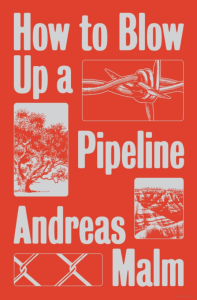Having twice read Andreas Malm’s How to Blow Up a Pipeline, I still don’t even know where to begin.
Despite its incendiary title, the book is not a “how to” so much as a “why not?” Given the increasingly dire signals from Earth, Malm asks: “When do we start physically attacking the things that consume our planet and destroy them with our own hands?” Third Act, founded on nonviolent principles, would say never. More on that later.
Malm’s short book combines history, philosophy and organizing experience to call for more drastic action on climate. For starters, he says, many movements lauded for their nonviolent tactics were not always peaceful. After decades of peaceful pressure, the British suffragists resorted to property destruction: breaking windows at the prime minister’s residence and shops and torching mailboxes. “To be militant in some form, or other, is a moral obligation,” suffragist Emmeline Pankhurst said. A violent uprising in Haiti brought emancipation there, and the US fought a Civil War to end slavery here. In South Africa in 1960, after years of boycotts, strikes, pass-burnings and other civil disobedience, Nelson Mandela called for acts of sabotage and, if that didn’t work, “guerrilla warfare and terrorism.” Some activists have targeted pipelines, including those in the Niger Delta fighting predatory and polluting oil companies. Malm argues that the nonviolent U.S. civil rights movement was successful in part because a violent “radical flank” also posed a threat.
Malm asks: “Is the root system of fossil fuels within the prevailing order so shallow that they can be extracted with smaller effort than any of those other ills?”
In July 2007, in a wealthy Stockholm neighborhood, Malm was among climate activists who “disarmed” 60 SUVs. They left a note on each windshield: “We have deflated one or more of the [tires] on your SUV. Don’t take it personally. It’s your SUV we dislike. You are certainly aware of how much gas it guzzles, so we don’t need to enlighten you about it. But what you seem to not know, or not care about, is that all the gasoline you burn to drive your SUV on the city’s streets has devastating consequences for others.” The notes explained the climate crisis and encouraged the owners to use readily available public transit. They announced the sabotage efforts in a blog post. Copycat actions persisted through the summer, only to be called off as winter approached so as not to endanger any lives on slippery roads because some people tried to drive their SUVs anyway.
One of the criticisms of the SUV action was that it targeted private consumption instead of fossil-fuel production. Malm counters that consumption, particularly by the super-rich, is a big part of the problem. Take so-called superyachts, he says. One study showed that, in one year, the global fleet of just 300 of these yachts “generates as much CO2 as the 10 million inhabitants of Burundi.” Other studies differentiate between “subsistence emissions” – from rice paddies or cattle in developing nations – and “luxury emissions” that are entirely optional.
“The rich could claim ignorance in 1913,” Malm writes. “Not so now. A group of American and British criminologists have consequently argued that conspicuous consumption of fossil fuels ought to be classified as a crime.” Luxury emissions, he says, need to go first: “If we cannot even get rid of the most preposterously unnecessary emissions, how are we going to begin moving towards zero.”
In a 2016 action, Malm participated with Ende Gelande in civil disobedience, breaking through fencing, storming into a coal plant and shutting off power for a limited time. The plant’s CEO called it “massive criminal violence,” irony not lost on Malm: “the breaking of fences could be officially framed as … devastation, unimaginable damage, whereas the perpetual cloud of CO2 from [the coal plant] was the mark of a peaceful normality.”
Malm discusses Bill McKibben’s commitment to nonviolence, a core principle for Third Act. In part, McKibben finds a “spiritual insight” in nonviolence, involving the idea of “turning the other cheek, of taking on unearned suffering.” Malm has little patience for that approach: “Isn’t suffering unearned by the victims precisely what is so morally repugnant about the unfolding crisis?” McKibben has landed on nonviolence as the better strategy, the “tactically sound choice” and the “greatest ‘innovation’ of the twentieth century.” McKibben also maintains that our strength lies in numbers, not violent acts. The state will always have the advantage in a fight of arms, to which Malm counters that the “enemy has overwhelmingly superior capabilities in virtually all fields, including media, propaganda, institutional coordination, logistical resources, political legitimacy and, above all, money.” Of course, the Trump regime now poses added risks, as it silences dissent – from law firms, universities, students and more – and decrees that “climate change” are forbidden words.
Malm finished the book just before the pandemic, when Greta Thunberg and climate strikes were in the news and huge actions in the works. The pandemic shut all that down. It also temporarily slowed emissions as much of commerce came to halt. Whatever one thinks of the merits of sabotage vs. peaceful protest and nonviolent civil disobedience, the pandemic raised a key question for Malm: “If a pandemic can induce governments to take emergency actions, why can’t a climate breakdown that threatens to kill off the very life-support systems of the planet do the same? After this, there can be no more excuses for passivity.”
